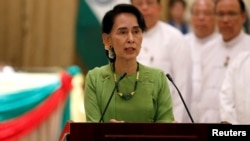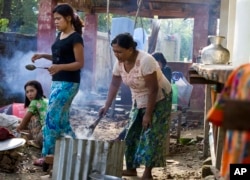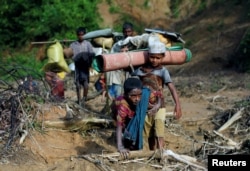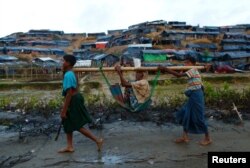Myanmar's de-facto leader Aung San Suu Kyi has cancelled plans to attend this month's United Nations General Assembly amid rising international criticism of her handling of the violence in western Myanmar that has forced as many as 370,000 ethnic Rohingya Muslims to flee across the border to Bangladesh.
Government spokesman Zaw Htay said Wednesday that the Nobel Peace laureate will remain in Myanmar to deal with the ongoing security situation.
The spokesman also announced, however, that Aung San Suu Kyi would be giving a televised address next week, on September 19, to "speak for national reconciliation and peace" in her first public comments on the crisis in Rakhine state.
Aung San Suu Kyi has been held up as an icon of democracy due to her decades-long detention under Myanmar's former military rulers. But her apparent indifference to the plight of the Rohingyas in Rakhine state -- she has dismissed many reports of the situation as “fake information” designed to promote the interests of “terrorists" -- has brought scorn from governments and human rights activists, including a number of her fellow Nobel Peace laureates.
The U.N. Security Council is scheduled to hold an urgent meeting Wednesday on the violence and subsequent humanitarian crisis in Rakhine state. The meeting was requested by Britain and Sweden on Monday after U.N. human rights chief Zeid Ra'ad al-Hussein referred to the treatment of the Rohingya as "a textbook example of ethnic cleansing."
The violence first erupted on August 25, when a group of Rohingya militants attacked dozens of police posts and an army base in what they said was an effort to protect their ethnic minority from persecution. About 400 people have been killed in subsequent clashes and a military counteroffensive that has triggered the current exodus.
Speaking from Bangladesh, Tirana Hassan, Amnesty International's crisis response director, told U.N. reporters, "These people have been walking, some of them for days, escaping what can only be described as widespread and systematic abuses.
She said Amnesty International fully agrees "with the assessment of the High Commissioner for Human Rights in calling this ethnic cleansing, and it is textbook.”
Swedish Ambassador Olof Skoog said in a statement, "We called this meeting as we are deeply concerned by the reports emerging from Rakhine state and the horrifying stories being recounted by Rohingya refugees who have reached Bangladesh. It is important that the Security Council plays its role in responding.”
Jean Leiby of the United Nations Children's Fund (UNICEF) says Rohingya camps are crowded with children, who are in a fragile state. He says about 200,000 children many be at risk of water-borne diseases and are in urgent need of support.
“You see children who have not slept for days," Leiby said. "They are weak, hungry. After the long journey and a challenging journey, many children are sick and need health care right away. Some children are also in extreme and difficult situations and are traumatized, are in need of protection and psychological support.”
The refugee agency dispatched a flight to Bangladesh carrying emergency aid – 91 tons of relief, including shelter materials, blankets, sleeping mats and other essential items -- for Rohingya refugees. The cargo has been loaded onto trucks that will bring the supplies to the refugee camps at Cox’s Bazar district.
A second flight, donated by the United Arab Emirates, has also landed in Bangladesh, carrying about 2,000 family tents. The supplies in both flights will help 25,000 refugees, and further flights are planned so that a total of 120,000 people can be assisted.
The Rohingya are one of Myanmar's many ethnic minorities in the Buddhist-majority nation. They are considered to be economic migrants from Bangladesh and have been denied citizenship, even though most can show their families have been in the country for generations.








